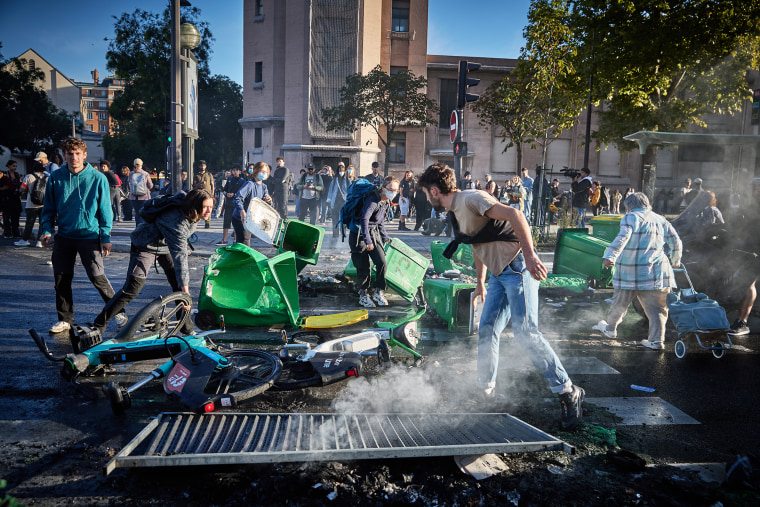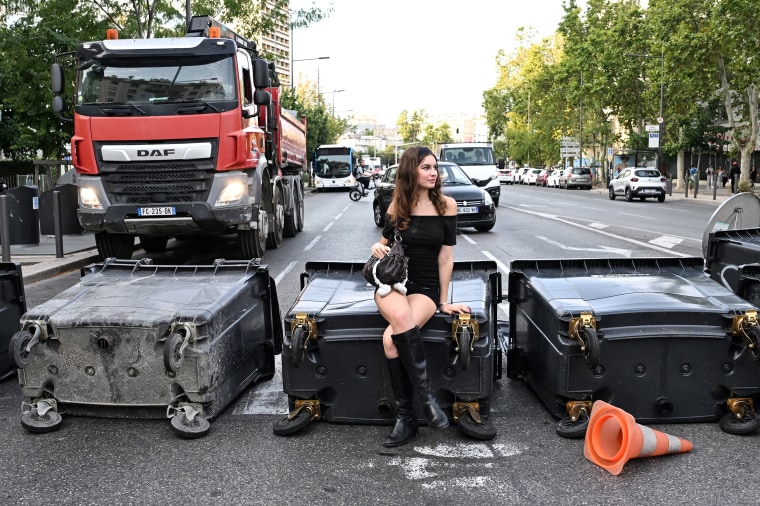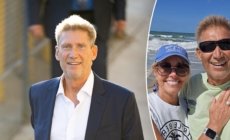-
How Did Dillon Gabriel Do in His First Start With Browns? - 41 mins ago
-
Derek Jeter: Cowboys’ Dak Prescott Needs To Win To ‘Change The Narrative’ - 47 mins ago
-
‘Golden Bachelor’ alum Gerry Turner engaged months after Theresa Nist divorce - about 1 hour ago
-
How to Watch Dolphins vs Panthers: Live Stream NFL Week 5, TV Channel - about 1 hour ago
-
Bills’ Josh Allen, Eagles’ Nick Sirianni Lead: Who Has It Better Than them? | FOX NFL Sunday - 2 hours ago
-
Small earthquake cluster hits near Big Bear Lake in San Bernardino County - 2 hours ago
-
Dyan Cannon, 88, clarifies viral ‘friends with benefits’ misunderstanding - 2 hours ago
-
Caesars Sportsbook Promo Code NEWSWK20X: Claim Top NFL Week 5 Sign-Up Bonus - 2 hours ago
-
'These games come down to one or two plays' — Alex Rodriguez on Mariners Game 1 loss to Tigers - 2 hours ago
-
Zac Brown engaged to Kendra Scott, plans to blend their families together - 3 hours ago
‘Block everything’ protests sweep France, intensifying pressure on Macron
PARIS — Protesters set fires as they blocked highways and gas stations across France early Wednesday as part of a new nationwide movement. Authorities deployed 80,000 police, who made hundreds of arrests and fired tear gas to disperse crowds.
The “Block Everything” movement was born online over the summer in far-right circles, but spread on social media and was co-opted by left-wing, antifascist and anarchist groups. It now includes France’s far-left parties and the country’s powerful labor unions.
Their joint day of unrest adds to the country’s political turmoil, after the collapse of centrist President Emmanuel Macron’s government earlier this week in a similar backlash over proposed budget cuts and broader anger at the political class.
Barricades were erected in several major French cities, including Lyon, Marseille, and Toulouse. Entry to an Amazon depot in northern France was also blocked as the country’s largest union said some 715 disruptions had been organized nationwide.
In the capital Paris, groups gathered and set up barricades at several entry points to the city. Demonstrations were expected to continue throughout the day, with travel disrupted as some of the main transport unions joined the strike.
There were dramatic scenes outside a high school in eastern Paris, where police clashed with dozens of students who had blocked entry to the building.

“Police forced the opening of one of the doors to let students in and there was some violence with tear gas,” Ariane Anemoyannis, spokesperson for the youth group ‘Le Poing Leve,’ who was at the scene, told NBC News.
An earlier strike, organized by transport workers near the high school, was also broken up by police, said Anemoyannis.
“There were several hundred people who showed up in support of the workers,” she said, “the police charged against the picketline to break up the strike.”
Public anger in France grew when then-Prime Minister Francois Bayrou announced his plan to cut the budget by over $50 billion. He proposed striking two national holidays from the calendar, freezing pensions for 2026 and cutting billions in health spending.
The two extremes of the political spectrum joined forces in the National Assembly on Monday, causing the collapse of the French government in a no confidence vote fueled by opposition to the budget cuts.
But although Bayrou might be gone, the deep mistrust over his proposed austerity plan and the government as a whole remains.
Some are turning their sights on Macron, calling for his resignation before his tenure is scheduled to end in 2027. He named his fifth prime minister in less than two years on Tuesday, choosing close ally Sébasten Lecornu.
Many taking to the streets say they resent being asked to make sacrifices while those they describe as the ruling elite are increasingly disconnected from their reality and daily struggles.
For police, there’s an element of unpredictability: the demonstrations are decentralized and leaderless, with no specific union, organization or individual leading the charge.

On the eve of the demonstrations, the now-outgoing Interior Minister, Bruno Retailleau, said no violence would be tolerated and announced the deployment of 80,000 police and gendarmes — the French military police.
It’s a show of force not seen since the height of the Yellow Vests protests in 2018, sparked by Macron’s proposed fuel tax to curb carbon emissions.
Source link
































